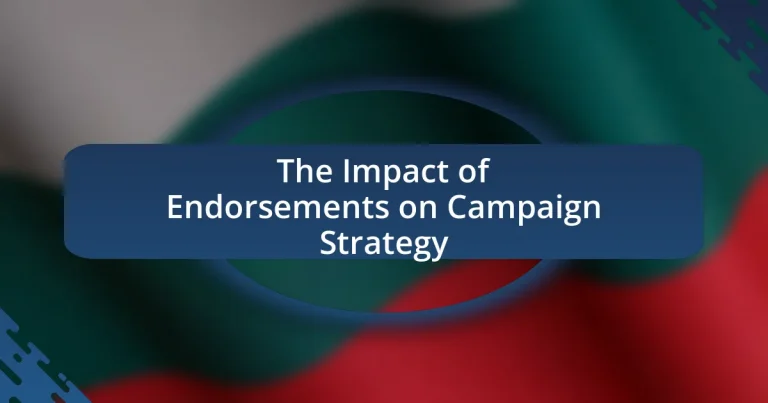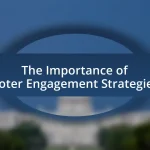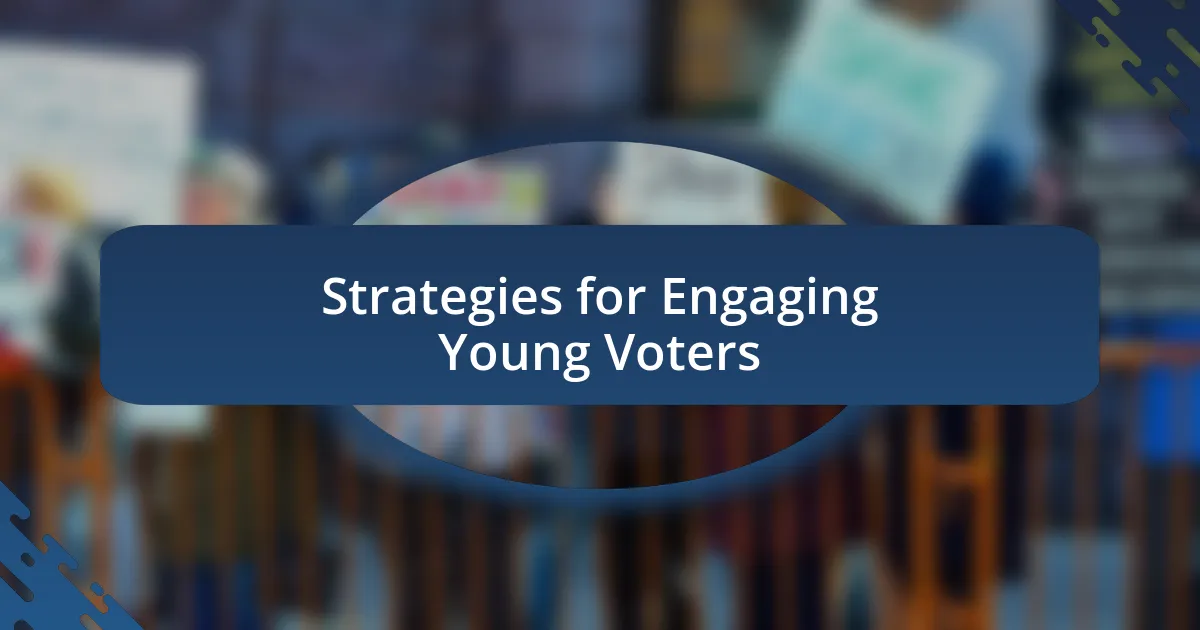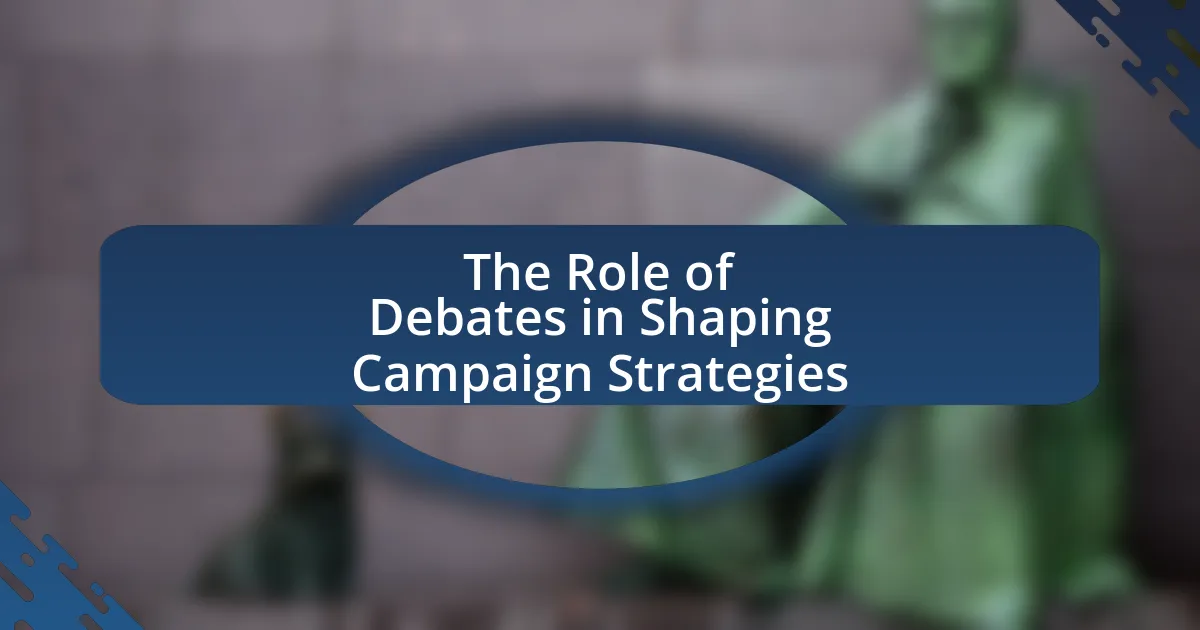The article examines the significant impact of endorsements on campaign strategy, highlighting how they enhance candidate credibility and visibility. It discusses the psychological factors that make endorsements effective, such as credibility and social proof, and explores how endorsements influence voter perception and mobilize specific demographics. The article also addresses the role of endorsements in shaping campaign messaging, their effectiveness in local versus national contexts, and best practices for leveraging endorsements to maximize voter turnout. Additionally, it outlines the risks associated with relying on endorsements and the importance of aligning endorsers with campaign objectives.
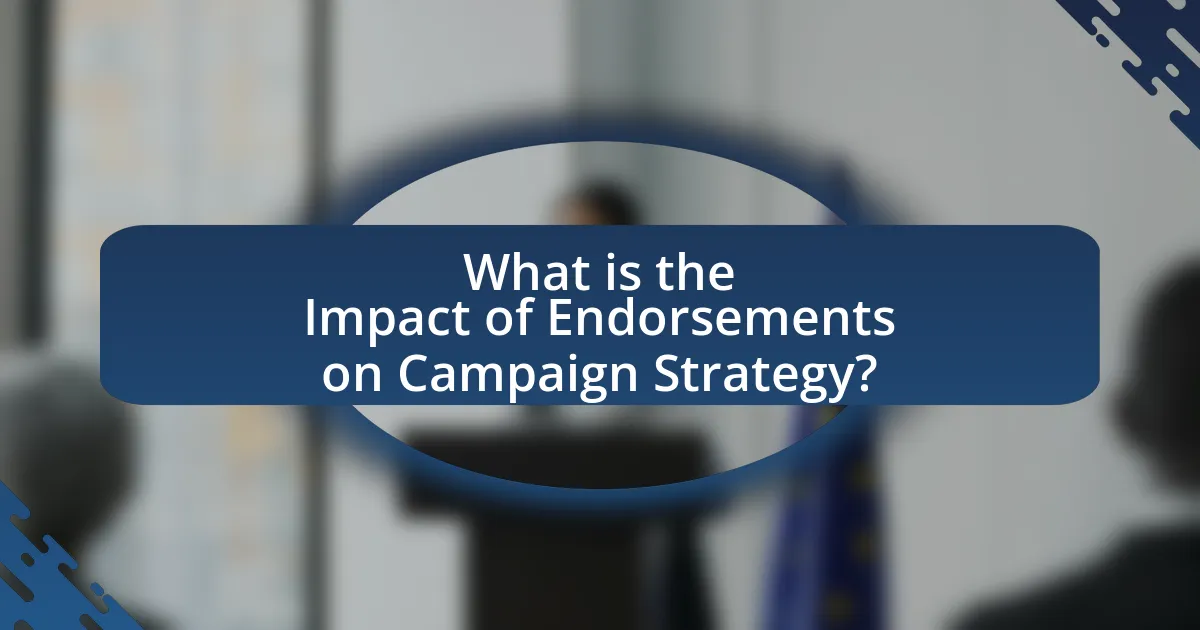
What is the Impact of Endorsements on Campaign Strategy?
Endorsements significantly enhance campaign strategy by increasing credibility and visibility for candidates. When a respected figure endorses a candidate, it can lead to a boost in public perception and voter trust, as seen in the 2008 U.S. presidential election when Barack Obama received endorsements from influential figures like Oprah Winfrey, which contributed to his appeal among undecided voters. Additionally, endorsements can mobilize specific voter demographics, as evidenced by endorsements from organizations that represent particular interest groups, thereby influencing voter turnout and engagement.
How do endorsements influence voter perception?
Endorsements significantly influence voter perception by enhancing the credibility and appeal of a candidate. When a respected figure or organization endorses a candidate, it can lead to increased trust and positive associations among voters. For instance, a study by the Pew Research Center found that endorsements from local leaders can sway undecided voters, as they often rely on trusted figures for guidance in their decision-making process. This effect is particularly pronounced in competitive races, where endorsements can differentiate candidates and shape public opinion.
What psychological factors make endorsements effective?
Endorsements are effective due to several psychological factors, including credibility, social proof, and emotional appeal. Credibility arises when the endorser is perceived as trustworthy and knowledgeable, which enhances the persuasive power of the endorsement. For instance, a study by Ohanian (1990) found that the perceived expertise and trustworthiness of a celebrity endorser significantly influenced consumer attitudes and purchase intentions. Social proof plays a crucial role as individuals often look to others for guidance in decision-making; endorsements signal that a product or idea is widely accepted or valued. Additionally, emotional appeal connects the endorser’s values or experiences with the audience, fostering a sense of relatability and trust. Research indicates that emotional connections can lead to increased brand loyalty and consumer engagement, as demonstrated in a study by Thomson, MacInnis, and Park (2005), which highlighted the importance of emotional resonance in advertising effectiveness.
How do endorsements shape candidate credibility?
Endorsements significantly enhance candidate credibility by signaling trust and approval from influential figures or organizations. When a respected individual or group endorses a candidate, it often leads voters to perceive the candidate as more legitimate and trustworthy. For instance, a study by the Pew Research Center found that endorsements from well-known political figures can increase a candidate’s favorability ratings by up to 20%. This effect occurs because endorsements serve as a heuristic for voters, simplifying their decision-making process by providing a shortcut to assess a candidate’s qualifications and reliability.
What role do endorsements play in campaign messaging?
Endorsements play a critical role in campaign messaging by enhancing credibility and influencing voter perceptions. When a candidate receives endorsements from respected figures or organizations, it signals to voters that the candidate is trustworthy and has the support of influential allies. For instance, a study by the Pew Research Center found that 70% of voters consider endorsements from local leaders as important in their decision-making process. This demonstrates that endorsements can significantly sway public opinion and increase a candidate’s visibility, ultimately impacting the effectiveness of their campaign messaging.
How can endorsements reinforce campaign themes?
Endorsements can reinforce campaign themes by providing credibility and validation to the candidate’s message. When a respected figure or organization endorses a candidate, it signals to voters that the candidate’s positions align with established values or beliefs, thereby strengthening the campaign’s core themes. For example, endorsements from influential community leaders can enhance a candidate’s appeal in specific demographics, as seen in the 2008 presidential campaign when Barack Obama received endorsements from prominent figures like Oprah Winfrey, which helped solidify his themes of hope and change. This alignment between endorsements and campaign themes can lead to increased voter trust and engagement, ultimately influencing election outcomes.
What types of endorsements are most impactful?
The most impactful types of endorsements are those from trusted public figures, organizations, and celebrities. Endorsements from well-respected individuals or groups can significantly influence public opinion and voter behavior, as they often carry credibility and authority. For instance, a study by the Pew Research Center found that endorsements from local leaders or organizations can increase voter turnout by up to 20%. Additionally, endorsements from celebrities can enhance a candidate’s visibility and appeal, particularly among younger demographics, as evidenced by the 2020 U.S. presidential election where celebrity endorsements played a crucial role in mobilizing voters.
Why are endorsements considered a strategic asset in campaigns?
Endorsements are considered a strategic asset in campaigns because they enhance credibility and influence voter perceptions. When a respected figure endorses a candidate, it signals to voters that the candidate is trustworthy and capable, which can significantly sway undecided voters. For instance, a study by the Pew Research Center found that endorsements from well-known public figures can increase a candidate’s favorability ratings by up to 20%. This demonstrates that endorsements not only validate a candidate’s platform but also mobilize support, making them a crucial component of effective campaign strategy.
How do endorsements affect fundraising and resource allocation?
Endorsements significantly enhance fundraising and resource allocation by increasing credibility and attracting donor interest. When a candidate receives an endorsement from a respected figure or organization, it often leads to a surge in contributions, as donors perceive the candidate as more viable and trustworthy. For instance, a study by the Pew Research Center found that candidates endorsed by prominent political figures raised, on average, 30% more funds than those without endorsements. This increase in funds allows for better resource allocation, enabling campaigns to invest in advertising, outreach, and mobilization efforts more effectively. Consequently, endorsements not only boost immediate financial support but also strategically position campaigns for long-term success.
What are the risks associated with relying on endorsements?
Relying on endorsements carries several risks, including potential damage to credibility, misalignment with target audiences, and over-dependence on external validation. When a campaign heavily leans on endorsements, it risks alienating constituents who may not resonate with the endorser’s values or reputation. For instance, a controversial figure endorsing a candidate can lead to backlash and loss of support among voters who disagree with that figure. Additionally, campaigns may become overly reliant on endorsements, neglecting grassroots efforts and authentic engagement with voters, which can undermine long-term voter relationships. Research indicates that endorsements can sway public opinion, but they can also backfire if the endorser’s image is tarnished or if the endorsement appears insincere, as seen in various political campaigns where endorsements did not translate into increased voter support.
How do endorsements vary across different political contexts?
Endorsements vary significantly across different political contexts, influencing voter perceptions and candidate viability. In highly polarized environments, endorsements from prominent figures or organizations can either solidify support among a candidate’s base or alienate undecided voters, as seen in the 2020 U.S. presidential election where endorsements from figures like Barack Obama were pivotal in rallying support for Joe Biden. Conversely, in less polarized contexts, endorsements may serve primarily as a signal of credibility and competence, as demonstrated in local elections where community leaders’ support can enhance a candidate’s appeal without the risk of divisiveness. Thus, the impact of endorsements is contingent upon the political landscape, shaping campaign strategies accordingly.
What factors determine the effectiveness of endorsements in local vs. national campaigns?
The effectiveness of endorsements in local versus national campaigns is primarily determined by the relevance of the endorser to the target audience, the perceived credibility of the endorser, and the alignment of the endorsement with the campaign’s message. In local campaigns, endorsements from community leaders or local organizations tend to resonate more strongly due to their established trust and familiarity within the community. For instance, a study by the Pew Research Center indicates that local endorsements can significantly sway voter opinions, as they often reflect shared values and concerns specific to the locality.
In contrast, national campaigns benefit from endorsements by high-profile figures or celebrities, which can enhance visibility and attract media attention. The effectiveness of these endorsements is often linked to the endorser’s national recognition and the ability to mobilize broader voter demographics. Research from the American Political Science Review shows that endorsements from well-known national figures can increase voter turnout by as much as 5% in certain demographics.
Additionally, the timing and context of the endorsement play crucial roles; endorsements that align with key campaign moments or issues tend to have a more substantial impact. Overall, the interplay of these factors—relevance, credibility, and timing—shapes the effectiveness of endorsements in both local and national campaigns.
How do cultural differences influence endorsement strategies?
Cultural differences significantly influence endorsement strategies by shaping consumer perceptions and preferences. For instance, in collectivist cultures, endorsements that emphasize community and family values resonate more effectively, while in individualistic cultures, personal achievement and self-expression are prioritized. Research by Hofstede highlights these cultural dimensions, indicating that understanding local values can enhance the effectiveness of endorsements. Brands that tailor their endorsement strategies to align with cultural norms can achieve higher engagement and trust, as evidenced by successful campaigns in diverse markets.
What are the best practices for leveraging endorsements in campaign strategy?
The best practices for leveraging endorsements in campaign strategy include selecting credible endorsers, aligning endorsements with target demographics, and utilizing endorsements across multiple platforms. Credible endorsers, such as respected community leaders or influential public figures, enhance the campaign’s trustworthiness and appeal. Aligning endorsements with the campaign’s target demographics ensures that the message resonates with the intended audience, increasing engagement and support. Utilizing endorsements across various platforms, including social media, traditional media, and campaign events, maximizes visibility and reinforces the endorsement’s impact. Research indicates that campaigns with strategic endorsements can experience a significant increase in voter support, as seen in the 2008 Obama campaign, which effectively utilized endorsements from high-profile figures to galvanize support.
How can campaigns identify the right endorsers?
Campaigns can identify the right endorsers by analyzing the alignment between the endorser’s values, audience, and the campaign’s objectives. This involves assessing the endorser’s credibility, reach, and relevance to the target demographic. For instance, a study by the American Marketing Association found that endorsements from individuals who share similar values with the target audience can increase campaign effectiveness by up to 50%. Additionally, utilizing social media analytics can help campaigns gauge the endorser’s influence and engagement levels, ensuring that the chosen endorser resonates with potential voters.
What strategies maximize the impact of endorsements on voter turnout?
Strategies that maximize the impact of endorsements on voter turnout include leveraging high-profile endorsements, targeting specific demographics, and utilizing social media effectively. High-profile endorsements from respected figures can significantly enhance a candidate’s credibility and attract undecided voters, as evidenced by studies showing that endorsements from celebrities or influential leaders can increase voter engagement by up to 20%. Targeting endorsements to resonate with specific demographic groups, such as young voters or minority communities, can also drive turnout, as tailored messages are more likely to motivate these groups. Additionally, effective use of social media platforms to disseminate endorsements can amplify their reach and influence, with research indicating that social media campaigns can increase voter turnout by facilitating discussions and mobilizing supporters.
